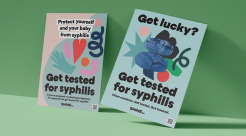
Herpes is an extremely common virus, so common in fact that it’s the most googled STI in South Australia.
Many people with herpes don’t even know they have it as they’ve never had symptoms. Despite how completely commonplace herpes is, stigma and myths surround this virus. Our sexual health experts set the record straight.
What is herpes and how is it spread?
Herpes is caused by Herpes Simplex Virus (HSV). There are two types of this virus, HSV 1 and HSV 2.
HSV 1 usually causes sores around the lips or face, known as cold sores.
HSV 2 usually causes blisters or sores around the genital area (including the bottom). It’s generally a more severe infection, with fever and flu-like symptoms. However, both types of virus can cause infection on the face or genital area and 50% of Australian people with genital herpes have HSV 1.
It is estimated that around 70-80 in every 100 Australian adults have been exposed to HSV 1, and around 12 in 100 carry HSV 2. Let that sink in: a majority of Australian adults have been exposed to and carry HSV 1.
Herpes is contagious, it enters the body through small cracks in the skin or through the lining of the mouth, genitals, anus and under the foreskin. These areas tend to be soft and moist to allow the virus to break through.
It is passed on from one person to another by skin-to-skin contact. If there are any sores or blisters, a person is more likely to pass on herpes. Even if there are no symptoms, it can still be possible to pass on herpes to a partner through kissing, oral, vaginal or anal sex.
The virus will then live in the nerve cells and stay there forever. Don’t worry, there is no need for the dramatic ‘dun, dun duuuunnn’ sound effects here. Herpes is not deadly and for many people the number of herpes episodes will reduce over their lifetime and often become less severe.
Remember if your partner/s have cold sores on the mouth you can get genital herpes through oral sex.
It is possible to have been exposed to herpes many years before having symptoms, the first episode doesn’t mean it was passed on from a current partner. The virus often activates for the first time when someone is stressed or run down.
How does someone know they have herpes?
The symptoms of the HSV are not the same for all people. So whilst many people have HSV, there are lots of people that will not even know they have it.
People won’t know they’ve been exposed to HSV until they have their first episode, this is where physical symptoms show up. This can include a cold sore, blisters, ulcers or split skin. An episode is when the virus is most contagious and likely to be spread.
What are the symptoms?
Symptoms can be different for each person, but can include:
- itching, stinging or tingling in the affected area
- small bumps or blisters that can break open and crust over
- burning or difficulty passing urine (wee)
- discharge.
How do I get tested for herpes?
Testing for herpes can get a little complicated. If you have symptoms, a swab should be taken from the area and sent for testing. A positive swab result confirms that you have HSV.
A negative test may mean that you don’t have the infection, or it may mean that the virus was not present on the skin when the swab was collected. There is no point getting tested when you don’t have symptoms as the swab will most likely be negative.
How do I get rid of herpes?
Whilst you can’t get rid of the virus, herpes is treatable.
Most herpes episodes last three to seven days. Antiviral medication is available on prescription from a doctor to help prevent or shorten these episodes. These tablets should be taken within the first three days of the symptoms appearing for best effect.
Local treatments (treatment to the affected area) may also help.
These include:
- salt baths, this may help if your genital area is painful (1tsp to 2 cups water)
- aspirin, ibuprofen or paracetamol to help relieve pain
- acyclovir creams, like Zovirax, which can be used on cold sores as soon as they appear
- topical anaesthetics such as lignocaine (can be applied on genital lesions)
- passing urine in a warm bath, if urinating is painful
- applying ice to the infected area to help relieve pain
In addition, you can:
- wear cotton underwear and loose-fitting clothing to increase comfort and help healing
- drink plenty of water (at least 1.5 L per day) so the urine is diluted and doesn’t sting when it contacts the genital sores
- rest to help recovery
Suppressive treatment is when you take a tablet every day to prevent episodes and this is usually used by people who have multiple episodes a year.
Note: Having active herpes sores can make it easier to get other sexually transmitted infections (STIs), including HIV. It is very important to have regular testing for other STIs.
How do I prevent herpes?
There are lots of ways to prevent getting herpes, the usual safer sex tools are a great place to start.
Condoms: Using condoms are a great way to reduce the risk of transmission. They should be used before there is any genital skin-to-skin contact. Unfortunately, they will not completely prevent herpes as the sores may not always be covered by the condom.
Active episodes: Avoid engaging in any sexual activity with someone who has visible cold sores, blisters or split skin on either the mouth or the genital area.
Lubricant: Using a lubricant during genital-to-genital/genital-to-anal contact will help reduce the chances of friction that can cause the tiny abrasions which can increase chances of herpes being passed on.
It’s important to remember that the nature of herpes (being contagious and sometimes transmissible without symptoms) means that you can be doing a lot of things ‘right’ and still get the infection. It’s a good idea to be having safer sex and treat symptoms but also remember no one is at fault for having herpes.
No one should feel shame for having a viral infection
Having herpes really just means you have a viral infection. Thanks (or no thanks) to stigma some people experience a sense of shame with their diagnosis. Although it’s easy to say ‘just get over it’, what’s important to remember is that people with herpes can and should live their lives in the way that want, have relationships, have (safer) sex and experience intimacy.
Should I tell my partner/s I have herpes?
There isn’t a rule as to whether you should tell a partner about having herpes. Some people don’t tell their sexual partner/s and choose not to have sex during an episode and practice safer sex by using condoms/dental dams. Suppressive therapy plus safer sex can reduce risk of transmission to a partner significantly.
If you’re concerned about passing on genital herpes, be upfront with your sexual partner/s before you engage in sexual activity. Communication is key at this point. If someone is genuinely interested in you before you tell them you have herpes, they should be after you tell them as well.
Given that a majority of Australians have been exposed to the herpes virus, there’s a good chance they have already been exposed as well. If you have your first episode while already having a sexual partner/s then they have probably already been exposed but most likely will not have symptoms. And remember first episode doesn’t necessarily mean it came from a current partner/s, you could have been exposed many years ago.
Does herpes affect fertility or pregnancy?
Herpes does not affect fertility (ability to get pregnant).
Pregnant people with a history of herpes can have a safe pregnancy and vaginal birth. However, if you have a genital herpes outbreak when you give birth, you could pass the virus to your baby during delivery. Herpes can cause serious problems for babies, so it’s important to tell your doctor or midwife if you or your partner have been diagnosed with herpes.
Support is available
If you are worried that you could have herpes or want to learn more, you can speak to SHINE SA or a GP.
If you’re nervous about speaking to someone face-to-face you can call SHINE SA’s Sexual Healthline service where you can speak to a sexual health nurse for free.
Call 1300 883 793, the Sexual Healthline is open Monday – Friday, 9:00am – 12:30pm.









